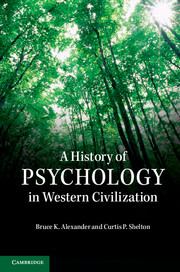Book contents
- Frontmatter
- Dedication
- Contents
- List of figures
- List of tables
- Preface
- Acknowledgements
- 1 Introduction: Two histories of Western psychology
- 2 Rationalism: Plato and the “just” person
- 3 Stoicism: Marcus Aurelius and the sufficient self
- 4 Christianity: St. Augustine and the incomplete soul
- 5 Materialism: Thomas Hobbes and the human machine
- 6 Empiricism: John Locke, David Hume, and experience as reality
- 7 Evolution: Charles Darwin and Homo sapiens as a work in progress
- 8 Medicine: Sigmund Freud and the world of neurotics
- 9 Re-imagining psychology
- Appendix A Plato’s nature of intelligence and other faculties
- Appendix B The search for Aunt Lena
- Index
- References
1 - Introduction: Two histories of Western psychology
Published online by Cambridge University Press: 05 July 2014
- Frontmatter
- Dedication
- Contents
- List of figures
- List of tables
- Preface
- Acknowledgements
- 1 Introduction: Two histories of Western psychology
- 2 Rationalism: Plato and the “just” person
- 3 Stoicism: Marcus Aurelius and the sufficient self
- 4 Christianity: St. Augustine and the incomplete soul
- 5 Materialism: Thomas Hobbes and the human machine
- 6 Empiricism: John Locke, David Hume, and experience as reality
- 7 Evolution: Charles Darwin and Homo sapiens as a work in progress
- 8 Medicine: Sigmund Freud and the world of neurotics
- 9 Re-imagining psychology
- Appendix A Plato’s nature of intelligence and other faculties
- Appendix B The search for Aunt Lena
- Index
- References
Summary
This book is meant for people who are thinking seriously about psychology, especially students who are considering psychology as a career. We are convinced that psychology is not being introduced historically enough in today’s textbooks or mass media, leaving much of its great thinking lying dormant. We hope to point our readers toward some brilliant and enduring ideas in the classic writings of great psychological scholars, in the hope that they will process them anew for the daunting new world of the twenty-first century.
This introductory chapter contrasts two ways of approaching the history of Western psychology. The scholarly history of psychology is the story of great ideas about the human psyche that have proved so stimulating and fruitful that they have become permanently embedded in Western culture. The professional history of psychology is the story of a sparkling new profession called “psychology” that was born in the nineteenth century to great expectations. This book concentrates on the scholarly history of Western psychology, but not exclusively. Although its main intent is to re-introduce vital scholarly insights to an unscholarly era, it also intends to show how professional psychology can benefit from being critically examined and ultimately re-imagined in a scholarly context.
- Type
- Chapter
- Information
- A History of Psychology in Western Civilization , pp. 1 - 30Publisher: Cambridge University PressPrint publication year: 2014



